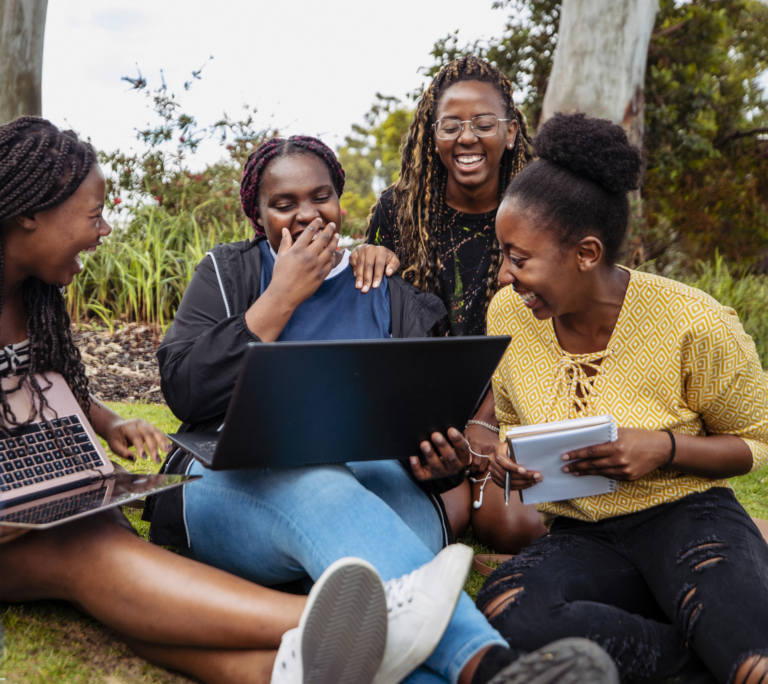The Scale of the Problem
Moving up the economic ladder is especially difficult for low-income children in the US – a majority of whom are Black and Latinx – that face systemic barriers to opportunity. The traditional path to economic mobility runs through higher education institutions, with individuals who obtain a college degree earning nearly $500K more over their lifetime than individuals with only a high school diploma. Historically Black Colleges and Universities (HBCUs) serve a large concentration of Black students, enrolling 10% of Black undergraduates and generating 17% of Black bachelor’s degrees. At the same time, HBCUs serve higher-need students at 1.6 times the rate of comparable Predominately White Institutions (PWIs). Despite having been systemically underfunded by at least $12.8B over the last three decades compared to their PWI counterparts, HBCUs continue to increase access and produce promising student outcomes and mobility results for these populations at rates on par or better than higher resourced PWIs.
100x less
Annual private funding for HBCUs vs. wealthy PWI universities
$6B
Endowment gap between HBCUs and PWIs
Only 107
HBCUs in the US
A Promising Solution
The HBCU Transformation Project enables the substantial transformation of HBCUs at scale, helping to close racial disparities and increase economic mobility and wealth-building for Black people and communities.
There is a compelling opportunity to invest in two primary intermediaries that have supported HBCUs for decades and a third that emerged during the COVID crisis. By investing in UNCF, TMCF, and EdAdvancement, we support a network of 40 high-performing and high-potential HBCUs to increase enrollments, increase student outcomes, and support their longer-term financial sustainability.
40%
increased enrollment at HBCUs
54%
increase in HBCU graduates
$1.1B
added to Black net worth annually by 2026
Blue Meridian's Investment
Rather than channeling resources to 107 different institutions, our investment in the HBCU Transformation Project partners with key intermediaries that build on the foundation already created by TMCF, UNCF, and EdAdvancement. The nearly $200M investment over a total of 5 years presents an opportunity to build the capacity for HBCUs – which already deliver strong results – to permanently improve their ability to achieve economic mobility outcomes for their primarily Black students and communities in the Southeast.
The initial $60 million investment supports the investee intermediaries and a first cohort of high-performing and high-potential HBCUs
The second investment of $124 million supports a second cohort and aims to increase enrollment and strengthen the ecosystem of providers available to support long-term transformation effort
Execute on their advocacy, capacity building, shared service, and institution performance improvement initiatives
Why We Are Excited About The HBCU Transformation Project
Every strategy in our investment portfolio is ready to embark on significant scaling and displays a multitude of strengths. Here are some highlights of the tremendous potential we saw in the HBCU Transformation Project scaling strategy that motivated us to invest:
Building on Existing Supports
The United Negro College Fund (UNCF) and Thurgood Marshall College Fund (TMCF) have over 100 years of experience serving HCBUs, and Predominantly Black Institutions (PBIs) combined. Meanwhile, Partnership for Education Advancement (EdAdvancement) emerged during the COVID-19 pandemic and is uniquely positioned to support capacity building and direct services for institutions despite the challenges of the ongoing crisis. Together, these three intermediaries will leverage their expertise in higher education as well as their close relationships with individual institutions to transform HBCUs over the next several years.

Potential for Impact at Scale
Many HBCUs outperform Predominantly White Institutions (PWIs) despite enrolling almost twice the percentage of low-income students (62% vs. 39%) and historic under-investment. The HBCU Transformation Project will support capacity building and performance improvement across the network of HBCUs, rather than disparate programs or initiatives with limited opportunity for scale.
This investment will also enhance sustainability efforts for the intermediaries and institutions as they increase their fundraising for capacity building generally and an endowment campaign across HBCUs.

Regional Focus with National Impact
Because HBCUs are mostly located in the Southeast, where mobility rates are the lowest in the country, they have an important regional and community impact. HBCUs primarily serve geographically proximate students, and they generate jobs by employing people from the surrounding area. Collectively, HBCUs create $14.8 billion in direct economic impact in their local communities. At the same time, investing in HBCUs is key to closing the racial wealth gap nationally – a long-term goal that could result in an estimated 4-6% increase in US GDP.

About HBCU Transformation Project
The HBCU Transformation Project is a first-of-its-kind collaboration between the Thurgood Marshall College Fund, United Negro College Fund, and Partnership for Education Advancement to build the capacity of HBCUs and intermediaries that serve them to create permanent improvement in their ability to achieve economic mobility outcomes for their primarily Black students and communities in the Southeast and beyond.
United Negro College Fund (UNCF) was founded in 1944 and serves 37 private HBCUs, educating ~45,000 students; Thurgood Marshall College Fund (TMCF) was founded in 1987 and serves 47 public HBCUs and Predominantly Black Institutions (PBIs), educating ~185,000 students; and Partnership for Education Advancement (formerly Education Finance Institute) aims to maintain and extend the impact of HBCUs as unique and critical drivers of racial equity and social justice.
News About HBCU Transformation Project
Why Applications To Historically Black Colleges Are Surging
Media
Jul 6, 2024
The Thurgood Marshall College Fund has a major impact on HBCU students
Media
Jun 13, 2024
Nation’s Largest HBCU Sees Record-Breaking Donations
Media
Jun 12, 2024
It Takes a Village: Improving Student Retention through Collaborative Partnerships
Media
Apr 15, 2024
The underfunding of HBCUs with Harry L. Williams, Ed.D
Media
Apr 2, 2024
Some HBCUs are seeing enrollment surge. Here’s why.
Media
Mar 19, 2024
UNCF CEO Talks Fundraising Success with Donors Big and Small
Media
Mar 7, 2024
Philanthropic group gifts United Negro College Fund $100 million grant to help boost HBCU endowments
Media
Jan 11, 2024
HBCUs Can Help Reverse the Black College Enrollment Recession
Media
Jan 11, 2024
Expanding Pathways to Economic Mobility
Updates
Sep 29, 2023
Why Applications To Historically Black Colleges Are Surging
Media
Jul 6, 2024
The Thurgood Marshall College Fund has a major impact on HBCU students
Media
Jun 13, 2024
Nation’s Largest HBCU Sees Record-Breaking Donations
Media
Jun 12, 2024
It Takes a Village: Improving Student Retention through Collaborative Partnerships
Media
Apr 15, 2024
The underfunding of HBCUs with Harry L. Williams, Ed.D
Media
Apr 2, 2024
Some HBCUs are seeing enrollment surge. Here’s why.
Media
Mar 19, 2024
UNCF CEO Talks Fundraising Success with Donors Big and Small
Media
Mar 7, 2024
Philanthropic group gifts United Negro College Fund $100 million grant to help boost HBCU endowments
Media
Jan 11, 2024
HBCUs Can Help Reverse the Black College Enrollment Recession
Media
Jan 11, 2024
Expanding Pathways to Economic Mobility
Updates
Sep 29, 2023
Why Applications To Historically Black Colleges Are Surging
Media
Jul 6, 2024
The Thurgood Marshall College Fund has a major impact on HBCU students
Media
Jun 13, 2024
Nation’s Largest HBCU Sees Record-Breaking Donations
Media
Jun 12, 2024
It Takes a Village: Improving Student Retention through Collaborative Partnerships
Media
Apr 15, 2024
The underfunding of HBCUs with Harry L. Williams, Ed.D
Media
Apr 2, 2024
Some HBCUs are seeing enrollment surge. Here’s why.
Media
Mar 19, 2024
UNCF CEO Talks Fundraising Success with Donors Big and Small
Media
Mar 7, 2024
Philanthropic group gifts United Negro College Fund $100 million grant to help boost HBCU endowments
Media
Jan 11, 2024
HBCUs Can Help Reverse the Black College Enrollment Recession
Media
Jan 11, 2024
Expanding Pathways to Economic Mobility
Updates
Sep 29, 2023
Why Applications To Historically Black Colleges Are Surging
Media
Jul 6, 2024
The Thurgood Marshall College Fund has a major impact on HBCU students
Media
Jun 13, 2024
Nation’s Largest HBCU Sees Record-Breaking Donations
Media
Jun 12, 2024
It Takes a Village: Improving Student Retention through Collaborative Partnerships
Media
Apr 15, 2024
The underfunding of HBCUs with Harry L. Williams, Ed.D
Media
Apr 2, 2024
Some HBCUs are seeing enrollment surge. Here’s why.
Media
Mar 19, 2024
UNCF CEO Talks Fundraising Success with Donors Big and Small
Media
Mar 7, 2024
Philanthropic group gifts United Negro College Fund $100 million grant to help boost HBCU endowments
Media
Jan 11, 2024
HBCUs Can Help Reverse the Black College Enrollment Recession
Media
Jan 11, 2024
Expanding Pathways to Economic Mobility
Updates
Sep 29, 2023
Why Applications To Historically Black Colleges Are Surging
Media
Jul 6, 2024
The Thurgood Marshall College Fund has a major impact on HBCU students
Media
Jun 13, 2024
Nation’s Largest HBCU Sees Record-Breaking Donations
Media
Jun 12, 2024
It Takes a Village: Improving Student Retention through Collaborative Partnerships
Media
Apr 15, 2024
The underfunding of HBCUs with Harry L. Williams, Ed.D
Media
Apr 2, 2024
Some HBCUs are seeing enrollment surge. Here’s why.
Media
Mar 19, 2024
UNCF CEO Talks Fundraising Success with Donors Big and Small
Media
Mar 7, 2024
Philanthropic group gifts United Negro College Fund $100 million grant to help boost HBCU endowments
Media
Jan 11, 2024
HBCUs Can Help Reverse the Black College Enrollment Recession
Media
Jan 11, 2024
Expanding Pathways to Economic Mobility
Updates
Sep 29, 2023
Why Applications To Historically Black Colleges Are Surging
Media
Jul 6, 2024
The Thurgood Marshall College Fund has a major impact on HBCU students
Media
Jun 13, 2024
Nation’s Largest HBCU Sees Record-Breaking Donations
Media
Jun 12, 2024
It Takes a Village: Improving Student Retention through Collaborative Partnerships
Media
Apr 15, 2024
The underfunding of HBCUs with Harry L. Williams, Ed.D
Media
Apr 2, 2024
Some HBCUs are seeing enrollment surge. Here’s why.
Media
Mar 19, 2024
UNCF CEO Talks Fundraising Success with Donors Big and Small
Media
Mar 7, 2024
Philanthropic group gifts United Negro College Fund $100 million grant to help boost HBCU endowments
Media
Jan 11, 2024
HBCUs Can Help Reverse the Black College Enrollment Recession
Media
Jan 11, 2024
Expanding Pathways to Economic Mobility
Updates
Sep 29, 2023
Why Applications To Historically Black Colleges Are Surging
Media
Jul 6, 2024
The Thurgood Marshall College Fund has a major impact on HBCU students
Media
Jun 13, 2024
Nation’s Largest HBCU Sees Record-Breaking Donations
Media
Jun 12, 2024
It Takes a Village: Improving Student Retention through Collaborative Partnerships
Media
Apr 15, 2024
The underfunding of HBCUs with Harry L. Williams, Ed.D
Media
Apr 2, 2024
Some HBCUs are seeing enrollment surge. Here’s why.
Media
Mar 19, 2024
UNCF CEO Talks Fundraising Success with Donors Big and Small
Media
Mar 7, 2024
Philanthropic group gifts United Negro College Fund $100 million grant to help boost HBCU endowments
Media
Jan 11, 2024
HBCUs Can Help Reverse the Black College Enrollment Recession
Media
Jan 11, 2024
Expanding Pathways to Economic Mobility
Updates
Sep 29, 2023
Why Applications To Historically Black Colleges Are Surging
Media
Jul 6, 2024
The Thurgood Marshall College Fund has a major impact on HBCU students
Media
Jun 13, 2024
Nation’s Largest HBCU Sees Record-Breaking Donations
Media
Jun 12, 2024
It Takes a Village: Improving Student Retention through Collaborative Partnerships
Media
Apr 15, 2024
The underfunding of HBCUs with Harry L. Williams, Ed.D
Media
Apr 2, 2024
Some HBCUs are seeing enrollment surge. Here’s why.
Media
Mar 19, 2024
UNCF CEO Talks Fundraising Success with Donors Big and Small
Media
Mar 7, 2024
Philanthropic group gifts United Negro College Fund $100 million grant to help boost HBCU endowments
Media
Jan 11, 2024
HBCUs Can Help Reverse the Black College Enrollment Recession
Media
Jan 11, 2024
Expanding Pathways to Economic Mobility
Updates
Sep 29, 2023
Why Applications To Historically Black Colleges Are Surging
Media
Jul 6, 2024
The Thurgood Marshall College Fund has a major impact on HBCU students
Media
Jun 13, 2024
Nation’s Largest HBCU Sees Record-Breaking Donations
Media
Jun 12, 2024
It Takes a Village: Improving Student Retention through Collaborative Partnerships
Media
Apr 15, 2024
The underfunding of HBCUs with Harry L. Williams, Ed.D
Media
Apr 2, 2024
Some HBCUs are seeing enrollment surge. Here’s why.
Media
Mar 19, 2024
UNCF CEO Talks Fundraising Success with Donors Big and Small
Media
Mar 7, 2024
Philanthropic group gifts United Negro College Fund $100 million grant to help boost HBCU endowments
Media
Jan 11, 2024
HBCUs Can Help Reverse the Black College Enrollment Recession
Media
Jan 11, 2024
Expanding Pathways to Economic Mobility
Updates
Sep 29, 2023
Why Applications To Historically Black Colleges Are Surging
Media
Jul 6, 2024
The Thurgood Marshall College Fund has a major impact on HBCU students
Media
Jun 13, 2024
Nation’s Largest HBCU Sees Record-Breaking Donations
Media
Jun 12, 2024
It Takes a Village: Improving Student Retention through Collaborative Partnerships
Media
Apr 15, 2024
The underfunding of HBCUs with Harry L. Williams, Ed.D
Media
Apr 2, 2024
Some HBCUs are seeing enrollment surge. Here’s why.
Media
Mar 19, 2024
UNCF CEO Talks Fundraising Success with Donors Big and Small
Media
Mar 7, 2024
Philanthropic group gifts United Negro College Fund $100 million grant to help boost HBCU endowments
Media
Jan 11, 2024
HBCUs Can Help Reverse the Black College Enrollment Recession
Media
Jan 11, 2024
Expanding Pathways to Economic Mobility
Updates
Sep 29, 2023
Why Applications To Historically Black Colleges Are Surging
Media
Jul 6, 2024
The Thurgood Marshall College Fund has a major impact on HBCU students
Media
Jun 13, 2024
Nation’s Largest HBCU Sees Record-Breaking Donations
Media
Jun 12, 2024
It Takes a Village: Improving Student Retention through Collaborative Partnerships
Media
Apr 15, 2024
The underfunding of HBCUs with Harry L. Williams, Ed.D
Media
Apr 2, 2024
Some HBCUs are seeing enrollment surge. Here’s why.
Media
Mar 19, 2024
UNCF CEO Talks Fundraising Success with Donors Big and Small
Media
Mar 7, 2024
Philanthropic group gifts United Negro College Fund $100 million grant to help boost HBCU endowments
Media
Jan 11, 2024
HBCUs Can Help Reverse the Black College Enrollment Recession
Media
Jan 11, 2024
Expanding Pathways to Economic Mobility
Updates
Sep 29, 2023
Why Applications To Historically Black Colleges Are Surging
Media
Jul 6, 2024
The Thurgood Marshall College Fund has a major impact on HBCU students
Media
Jun 13, 2024
Nation’s Largest HBCU Sees Record-Breaking Donations
Media
Jun 12, 2024
It Takes a Village: Improving Student Retention through Collaborative Partnerships
Media
Apr 15, 2024
The underfunding of HBCUs with Harry L. Williams, Ed.D
Media
Apr 2, 2024
Some HBCUs are seeing enrollment surge. Here’s why.
Media
Mar 19, 2024
UNCF CEO Talks Fundraising Success with Donors Big and Small
Media
Mar 7, 2024
Philanthropic group gifts United Negro College Fund $100 million grant to help boost HBCU endowments
Media
Jan 11, 2024
HBCUs Can Help Reverse the Black College Enrollment Recession
Media
Jan 11, 2024
Expanding Pathways to Economic Mobility
Updates
Sep 29, 2023
Why Applications To Historically Black Colleges Are Surging
Media
Jul 6, 2024
The Thurgood Marshall College Fund has a major impact on HBCU students
Media
Jun 13, 2024
Nation’s Largest HBCU Sees Record-Breaking Donations
Media
Jun 12, 2024
It Takes a Village: Improving Student Retention through Collaborative Partnerships
Media
Apr 15, 2024
The underfunding of HBCUs with Harry L. Williams, Ed.D
Media
Apr 2, 2024
Some HBCUs are seeing enrollment surge. Here’s why.
Media
Mar 19, 2024
UNCF CEO Talks Fundraising Success with Donors Big and Small
Media
Mar 7, 2024
Philanthropic group gifts United Negro College Fund $100 million grant to help boost HBCU endowments
Media
Jan 11, 2024
HBCUs Can Help Reverse the Black College Enrollment Recession
Media
Jan 11, 2024
Expanding Pathways to Economic Mobility
Updates
Sep 29, 2023
Why Applications To Historically Black Colleges Are Surging
Media
Jul 6, 2024
The Thurgood Marshall College Fund has a major impact on HBCU students
Media
Jun 13, 2024
Nation’s Largest HBCU Sees Record-Breaking Donations
Media
Jun 12, 2024
It Takes a Village: Improving Student Retention through Collaborative Partnerships
Media
Apr 15, 2024
The underfunding of HBCUs with Harry L. Williams, Ed.D
Media
Apr 2, 2024
Some HBCUs are seeing enrollment surge. Here’s why.
Media
Mar 19, 2024
UNCF CEO Talks Fundraising Success with Donors Big and Small
Media
Mar 7, 2024
Philanthropic group gifts United Negro College Fund $100 million grant to help boost HBCU endowments
Media
Jan 11, 2024
HBCUs Can Help Reverse the Black College Enrollment Recession
Media
Jan 11, 2024
Expanding Pathways to Economic Mobility
Updates
Sep 29, 2023
Why Applications To Historically Black Colleges Are Surging
Media
Jul 6, 2024
The Thurgood Marshall College Fund has a major impact on HBCU students
Media
Jun 13, 2024
Nation’s Largest HBCU Sees Record-Breaking Donations
Media
Jun 12, 2024
It Takes a Village: Improving Student Retention through Collaborative Partnerships
Media
Apr 15, 2024
The underfunding of HBCUs with Harry L. Williams, Ed.D
Media
Apr 2, 2024
Some HBCUs are seeing enrollment surge. Here’s why.
Media
Mar 19, 2024
UNCF CEO Talks Fundraising Success with Donors Big and Small
Media
Mar 7, 2024
Philanthropic group gifts United Negro College Fund $100 million grant to help boost HBCU endowments
Media
Jan 11, 2024
HBCUs Can Help Reverse the Black College Enrollment Recession
Media
Jan 11, 2024
Expanding Pathways to Economic Mobility
Updates
Sep 29, 2023
Why Applications To Historically Black Colleges Are Surging
Media
Jul 6, 2024
The Thurgood Marshall College Fund has a major impact on HBCU students
Media
Jun 13, 2024
Nation’s Largest HBCU Sees Record-Breaking Donations
Media
Jun 12, 2024
It Takes a Village: Improving Student Retention through Collaborative Partnerships
Media
Apr 15, 2024
The underfunding of HBCUs with Harry L. Williams, Ed.D
Media
Apr 2, 2024
Some HBCUs are seeing enrollment surge. Here’s why.
Media
Mar 19, 2024
UNCF CEO Talks Fundraising Success with Donors Big and Small
Media
Mar 7, 2024
Philanthropic group gifts United Negro College Fund $100 million grant to help boost HBCU endowments
Media
Jan 11, 2024
HBCUs Can Help Reverse the Black College Enrollment Recession
Media
Jan 11, 2024
Expanding Pathways to Economic Mobility
Updates
Sep 29, 2023